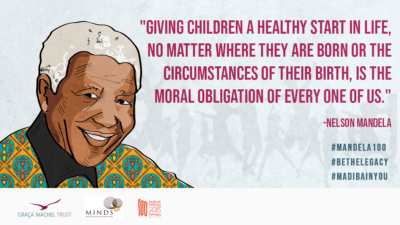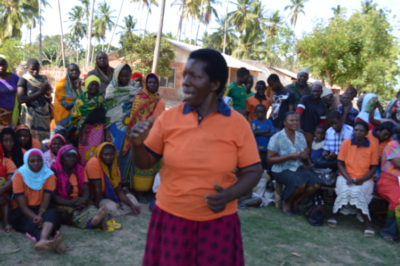
In 1996, when Nelson Mandela was the president of South Africa, he emphasized the need for health and nutrition for all in South Africa. In March 1996, he received the honorary fellowship of the Royal College of Surgeons in appreciation of the work he was doing for health and nutrition. In getting this award, Mandela said; “…That is why our government’s very first steps included the provision of free health care at our hospitals and clinics for pregnant mothers and young children, as well as a comprehensive primary school nutrition scheme. That is why our Bill of Rights affirms the right of every child to basic nutrition and basic health and social services.”
In the same way Nelson Mandela was a nutrition champion, the Graça Machel Trust celebrates its own nutrition guru – Christine Muyama. Christine was recognized as one of 10 2016 Nutrition Champions by Transform Nutrition a consortium of five international research and development partners funded by the British Department for International Development. The organisation uses research-based evidence to inspire effective action to address undernutrition.
Below is a question and answer session we had with Christine Muyama to learn more about why she is passionate about Nutrition and the impact she feels she is having in this space.
Q: Christine, why nutrition?

Christine Muyama
When you realise the benefits of nutrition to an individual and consequently to the Nation and what the countries and individuals suffer if they are not well nourished it becomes very clear why nutrition. When a person is well nourished, their brain develops and they are able to compete effectively in the world as they are able to function at their full potential. They are also very health individuals who seldom get sick and thus are productive citizens. On the other hand, malnourished persons often get sick, are not able to work to their full potential and governments spends millions of moneys to treat the effects of malnutrition.
What inspires you to follow this path?
After failing to get the necessary grades to attend medical school, I thought that my dream of making a difference to the lives of millions of children in Africa had been dashed. An internship in Karamoja, an area in Uganda with one of the highest rates of malnutrition changed all this for me. Overwhelmed, by the depths of suffering I saw among severely malnourished children in the area, I recognised immediately that I could make a difference, by ensuring they get the nutrition they needed. I further got my chance when I qualified as a coordinator for the Civil Society Alliance in Uganda and became the voice of the country’s many malnourished children who account for 33% of the children under the age of five.
Q: What have been some of your highlights working in the nutrition space with Graça Machel trust?
One of the first assignment that I engaged in when I joined the Graça Machel Trust was to organise a nutrition advocacy training with Members of Parliament (MPs) in Malawi. This training was to generated interest from the MPs, especially regarding nutrition budget allocations at the district level. Following this training the members of parliament requested to be training on the budgeting process and how they can influence to include nutrition intervention, which we did and these MPs have ever since been championing nutrition advocacy right to the grassroots especially on budgetary allocation to nutrition, and recently these MPs were key in passing the Malawi Nutrition Policy. It is amazing the ripple effect one activity can have especially when the target audience gets the information right.
Q: Do you think enough is being done to address the nutrition challenges in Africa? If no what are some of the glaring situations?
Over the last years a lot has been done to address the issue of nutrition and many governments and individuals are becoming more aware of the consequences of malnutrition but still a lot needs to be done if no child should go hungry or suffer from malnutrition. One of the best ways to engage is with decision makers, and MPs in particular, when we provide them with evidence, share first-hand human stories with them, hearing a mother explain what it is like to have a child suffering from malnutrition, and what can be done, helps bring the issue to life and thus making them our champions.
Q: Any role models you look up to in this space?

Scholastica Nguli
There are these amazing women in a small village in Tanzania called Rondo that have taken up the role of moving door to door teaching fellow women how to feed their children and the family at large using the locally available foods. They inspire me to do more than what I set out to do.
Q: What motivates you and keeps you pushing towards your goals?
The fact that simple cost- effective solutions is all it takes to create the change we desire drives me every day, for example all a child needs in the first six months is break milk, making environments safe and convenient for mothers to breastfeed is all we need to do to ensure that children are well nourished in their first six months on earth. Another driver is the happiness, smiles and change in attitude in a child who has been treated and recovered from malnutrition, those smiles drive me every day.
What change do you want to see happening in your community? You hold the power to ensure that this transformation happens. Take a stand like Nelson Mandela and other young people like Christine have done and get those wheels of change moving. To learn more about the Graça Machel Trust’s Nutrition program click here.










 The Trust supports and mobilises civil society networks on issues of ending child marriage, ending violence against children, ending female genital mutilation and promoting children’s rights, to carry out advocacy and action across Africa. Special focus is placed on Malawi, Mozambique, Tanzania and Zambia where child marriage continues to be a problem largely driven by poverty, gender inequality, harmful traditional practices, conflict, low levels of literacy, limited opportunities for girls and weak or non-existent protective and preventive legal frameworks.
The Trust supports and mobilises civil society networks on issues of ending child marriage, ending violence against children, ending female genital mutilation and promoting children’s rights, to carry out advocacy and action across Africa. Special focus is placed on Malawi, Mozambique, Tanzania and Zambia where child marriage continues to be a problem largely driven by poverty, gender inequality, harmful traditional practices, conflict, low levels of literacy, limited opportunities for girls and weak or non-existent protective and preventive legal frameworks.




 Education is a fundamental right for all children, which is also a vehicle for social, economic and political transformation in communities, countries and the African continent at large. Recent studies indicate a lack of progress in some of the critical commitments aimed at improving education quality, access, retention and achievement, particularly for girls. In most African countries, girls may face barriers to learning, especially when they reach post-primary levels of education. By implementing multi-dimensional approaches to education which includes core education, personal development, life skills and economic competencies, the Trust partners with funding partners, governments, civil societies and the private sector to improve education access.
Education is a fundamental right for all children, which is also a vehicle for social, economic and political transformation in communities, countries and the African continent at large. Recent studies indicate a lack of progress in some of the critical commitments aimed at improving education quality, access, retention and achievement, particularly for girls. In most African countries, girls may face barriers to learning, especially when they reach post-primary levels of education. By implementing multi-dimensional approaches to education which includes core education, personal development, life skills and economic competencies, the Trust partners with funding partners, governments, civil societies and the private sector to improve education access.

 The Nutrition and Reproductive, Maternal, New-born, Child and Adolescent Health and Nutrition, (RMNCAH+N) of the Children’s Rights and Development Programme aims at promoting the Global Strategy for women, children and adolescents’ health within the Sustainable Development Goals (SDG) agenda. The strategy emphasises on the importance of effective country leadership as a common factor across countries making progress in improving the health of women, children and adolescents.
The Nutrition and Reproductive, Maternal, New-born, Child and Adolescent Health and Nutrition, (RMNCAH+N) of the Children’s Rights and Development Programme aims at promoting the Global Strategy for women, children and adolescents’ health within the Sustainable Development Goals (SDG) agenda. The strategy emphasises on the importance of effective country leadership as a common factor across countries making progress in improving the health of women, children and adolescents. Through its Early Childhood Development (ECD) plan, The Trust will seek to put into action the new science and evidence Report that was presented by Lancet Series on Good and early development – the right of every child. This will be achieved by mobilising like-minded partners to contribute in the new science and evidence to reach all young children with ECD. The Trust’s goal is to be a catalyst for doing things differently, in particular, to rid fragmentation and lack of coordination across ECD sectors. In response to evidence showing the importance of political will in turning the tide against the current poor access and quality of ECD. Even before conception, starting with a mother’s health and social economic conditions, the early years of a child’s life form a fundamental foundation that determines whether a child will survive and thrive optimally.
Through its Early Childhood Development (ECD) plan, The Trust will seek to put into action the new science and evidence Report that was presented by Lancet Series on Good and early development – the right of every child. This will be achieved by mobilising like-minded partners to contribute in the new science and evidence to reach all young children with ECD. The Trust’s goal is to be a catalyst for doing things differently, in particular, to rid fragmentation and lack of coordination across ECD sectors. In response to evidence showing the importance of political will in turning the tide against the current poor access and quality of ECD. Even before conception, starting with a mother’s health and social economic conditions, the early years of a child’s life form a fundamental foundation that determines whether a child will survive and thrive optimally.